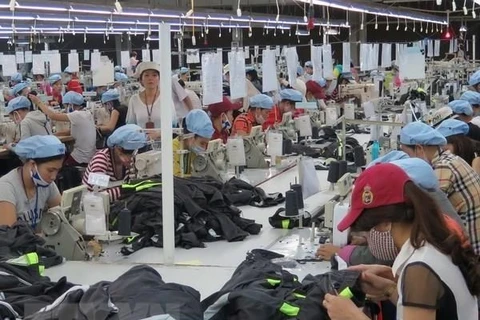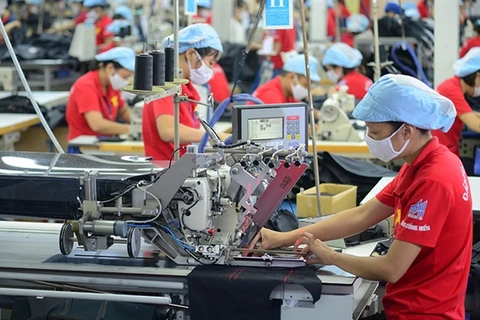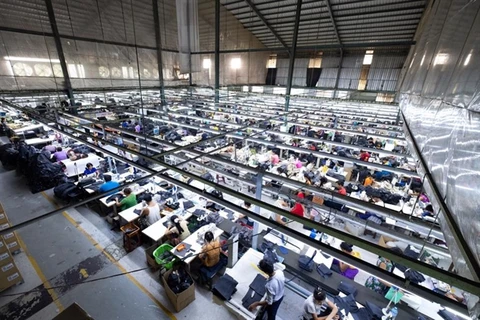Hanoi (VNS/VNA) - Vietnam's textile industry is working on adapting to new requests for materials traceability from international markets.
According to experts in the textile industry, many companies right now are facing great difficulty with the high demand for traceability of raw materials in multiple parts.
If companies want to trade in markets with whom Vietnam has signed a Free Trade Agreement (FTA), they have to ensure that the materials that are used to make their products are in line with the FTA environmental regulations in the importing countries.
Officials of the textile industry are currently working with the Ministry of Industry and Trade to build industrial compounds with wastewater treatment systems to ensure environmental protection.
Textile companies, especially those who are original design manufacturers (ODM), should carefully research Vietnam and the importing countries' traceability rules and standards.
ODMs are those that will be responsible for the direct development of the goods, purchasing raw materials, manufacturing the products, and then selling the products to other brands.
Vo Manh Hung, head representative of Cotton Council International (CCI) in Vietnam, said that cotton traceability is something that every company must account for when bringing their product to the world.
Currently, there are a lot of brands requesting that all their products have to be produced with sustainable cotton materials by 2030.
Truong Van Cam, Deputy Director of Vietnam Textile and Apparel Association (VITAS), said that if the industry wants to sustainably develop, companies will have to invest in sustainable development themselves and bring back economic benefits to the industry.
The industry has significantly contributed to Vietnam’s economic growth and exports.
In particular, in the first half of 2022, the industry's export revenue reached 22 billion USD, up 23% compared to the same period last year.
The textile industry is one of the key manufacturing industries of Vietnam’s economy, accounting for 12-16% of the country’s total export turnover. This industry also helps to create many jobs for labourers.
Digital transformation
Digital transformation plays an important role in improving the competitiveness of textile and apparel businesses, and businesses need to adopt it, a conference heard in HCM City late last week.
Nguyen Thi Tuyet Mai, Deputy General Secretary of the Vietnam Textile and Apparel Association, said more and more international textile and apparel companies are pursuing green production, which is posing a great challenge to Vietnam’s textile industry.
Vietnamese businesses also need to satisfy transparency requirements related to origin, domestic material use, labour, and environment commitments, she said.
Other experts told the conference that digital transformation is essential for improving businesses’ competitiveness, allowing them to meet customers’ demands related to quality and transparency.
Businesses should look at investing in technologies such as artificial intelligence and automation to improve production capability, and in training their workforce to use them, they said.
However, Mai said: “80% of businesses in the field are small- to medium-sized, and so they have limited access to capital needed for digital transformation and green production.”
The conference was held as part of the International Exhibition of Textile and Garments and Fabric and Garment Accessories (SaigonTex & SaigonFabric) being held at the Saigon Exhibition and Convention Centre in District 7 until August 6./.
According to experts in the textile industry, many companies right now are facing great difficulty with the high demand for traceability of raw materials in multiple parts.
If companies want to trade in markets with whom Vietnam has signed a Free Trade Agreement (FTA), they have to ensure that the materials that are used to make their products are in line with the FTA environmental regulations in the importing countries.
Officials of the textile industry are currently working with the Ministry of Industry and Trade to build industrial compounds with wastewater treatment systems to ensure environmental protection.
Textile companies, especially those who are original design manufacturers (ODM), should carefully research Vietnam and the importing countries' traceability rules and standards.
ODMs are those that will be responsible for the direct development of the goods, purchasing raw materials, manufacturing the products, and then selling the products to other brands.
Vo Manh Hung, head representative of Cotton Council International (CCI) in Vietnam, said that cotton traceability is something that every company must account for when bringing their product to the world.
Currently, there are a lot of brands requesting that all their products have to be produced with sustainable cotton materials by 2030.
Truong Van Cam, Deputy Director of Vietnam Textile and Apparel Association (VITAS), said that if the industry wants to sustainably develop, companies will have to invest in sustainable development themselves and bring back economic benefits to the industry.
The industry has significantly contributed to Vietnam’s economic growth and exports.
In particular, in the first half of 2022, the industry's export revenue reached 22 billion USD, up 23% compared to the same period last year.
The textile industry is one of the key manufacturing industries of Vietnam’s economy, accounting for 12-16% of the country’s total export turnover. This industry also helps to create many jobs for labourers.
Digital transformation
Digital transformation plays an important role in improving the competitiveness of textile and apparel businesses, and businesses need to adopt it, a conference heard in HCM City late last week.
Nguyen Thi Tuyet Mai, Deputy General Secretary of the Vietnam Textile and Apparel Association, said more and more international textile and apparel companies are pursuing green production, which is posing a great challenge to Vietnam’s textile industry.
Vietnamese businesses also need to satisfy transparency requirements related to origin, domestic material use, labour, and environment commitments, she said.
Other experts told the conference that digital transformation is essential for improving businesses’ competitiveness, allowing them to meet customers’ demands related to quality and transparency.
Businesses should look at investing in technologies such as artificial intelligence and automation to improve production capability, and in training their workforce to use them, they said.
However, Mai said: “80% of businesses in the field are small- to medium-sized, and so they have limited access to capital needed for digital transformation and green production.”
The conference was held as part of the International Exhibition of Textile and Garments and Fabric and Garment Accessories (SaigonTex & SaigonFabric) being held at the Saigon Exhibition and Convention Centre in District 7 until August 6./.
VNA























